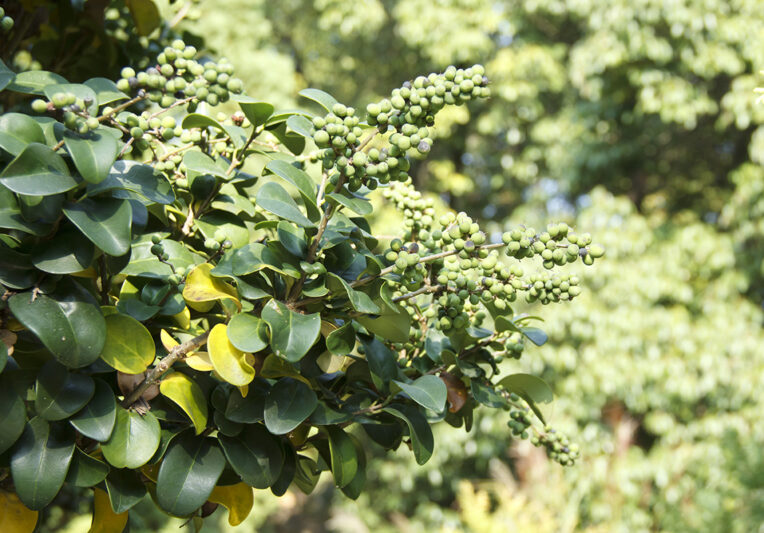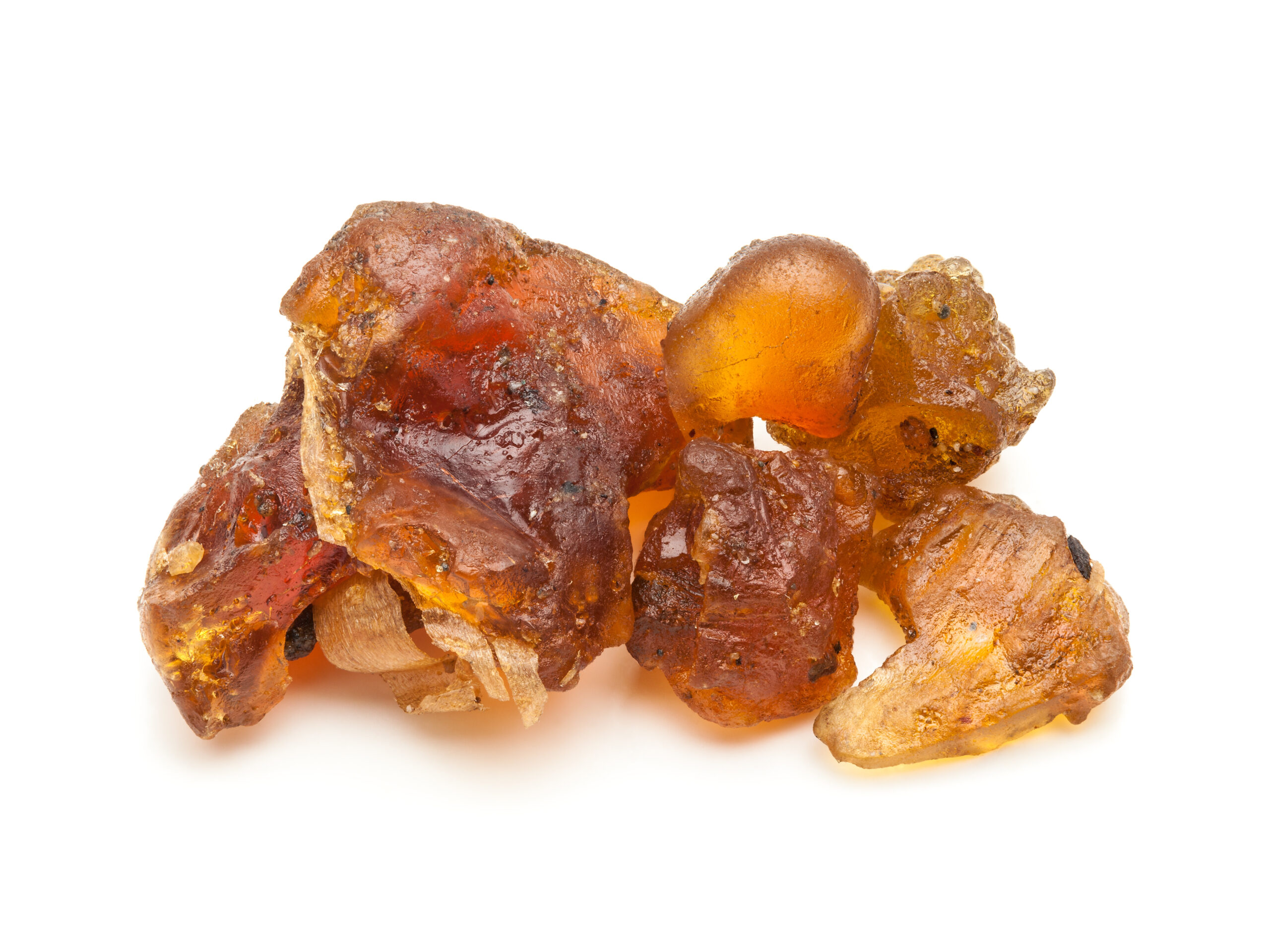Of the hundreds of herbs Ayurveda has to offer, guggul is one of the most important ones to add to your toolkit. Guggul and guggul-based formulas are among the most effective remedies you can use for chronic pain including back pain, joint pain, osteoarthritis and rheumatoid arthritis. Let’s get familiar with the benefits of guggul.
What is Ama?
“Ama” is a term that denotes undigested food that gets absorbed into the system without proper assimilation. Such partly digested material cannot be used by the system, and instead acts to clog it, eliciting an immune reaction. As our metabolism declines with age, Ama increases because these undigested aspects of our diet accumulate and cause most chronic degenerative disease. Guggul, which Ayurveda describes as having a “scraping action,” is considered to be the first choice botanical for the elimination of Ama from the system.
Anything that the body is unable to use or eliminate can be considered a toxin, whether it is fast food or organic lettuce. It can and does occur in people with the most pristine diets as well as those with a junk food regime.
There are many indications for the presence of Ama in the body, but the one that most of us complain of is general bodily stiffness and pains in the back and joints. These are commonly called “arthritic pains” and they can be autoimmune-driven or actual osteoarthritis.
Many people are familiar with the concept of detoxification or some kind of elimination process as a first step to healing. While there is merit to this, there are questions to consider as to how to go about it. Just eliminating certain foods and food groups from one’s diet may not be the answer. The inability to tolerate certain foods and environmental conditions may reflect a deeper weakness and deficiency that simply eliminating those factors may not address adequately.
Deficiency or weakness may not be the sole culprit in some cases. Certainly, we can exceed our body’s toxin-eliminating tolerance by consuming too much of the wrong foods (such as sugar), exposure to harmful environmental influences, or hormonal imbalance as a result of stress. Toxins of all kinds damage the DNA and it is a process called methylation that enables our body to repair the damage. That is why children can tolerate more foods like sugar and dairy that we can no longer tolerate as we age.
In any case, guggul is uniquely able to clear toxins forming ‘ama’ which inevitably accumulate with age from the system. In addition, guggul also promotes blood circulation by decreasing the blood’s clotting ability. For this reason, it should not be taken during pregnancy, at least two weeks before surgery or if one is already taking a pharmaceutical blood-thinning drug.

Commiphora wightii, with common names Indian bdellium-tree or Mukul myrrh tree, is a flowering plant in the family Burseraceae, which produces a fragrant resin called gugal that is used in incense and vedic medicine.
What is guggul?
Guggul (Commiphora wightii) is a flowering dessert bush-tree in the Burseraceae family related to both common myrrh and frankincense. Like frankincense and myrrh, it is used as incense as well as medicine. Native to southern Pakistan and western India, this species is uniquely different from myrrh because the resin is more water soluble which is essential for its preparation as medicinal guggul.
Like many valuable medicinal herbs, marketing tends to focus on one benefit which the public might find especially valuable, which in guggul’s case is that it lowers cholesterol. But this action is minor compared to its fundamental indication, which is pain, especially joint, back, hip, shoulder and other joint pains that afflict most people, especially as we age. With that indication one can use guggul as one might use boswellia for circulatory rheumatic and arthritic pains. Usually some or complete pain relief is achieved after a week or two of once or twice daily use.
Guggul in formula with other herbs
When combined with various herbs for other organs, diseases and systems in the body, the large series of guggul compounds can in themselves constitute a nearly complete system of medicine.
Guggul is far more effective than turmeric alone and in fact combines well with it. Its aforementioned ‘scraping” action scrapes the toxins (Ama) out of the tissues or joints, while turmeric counteracts the inflammation these toxins may cause. Together in a formula, guggul and turmeric can relieve pain and detoxify at the same time.
Guggul formulas are used to support a wide spectrum of bodily functions, including digestion, skin health, circulation, thyroid health, urinary management, lung maintenance, menstrual concerns and most famously, joint health.
Of the many guggul formulas, perhaps the most used is Yogaraj Guggul. It is specific for amavata (a toxin-laden nervous system), and is the best formula for rheumatoid arthritis as well as all other rheumatic joint, back and problems. It is also used for osteoporosis, overweight, and prostate gland enlargement. The list of ingredients in Yogaraj guggul varies with the manufacturer and is too long for to include in this blog.
Yogaraj guggul makes for comfortable, pain-free movement of the joints and muscles, rejuvenates and strengthens the skeletal and neuromuscular system, and promotes the elimination of natural endogenous toxins.
The main method for preparing guggul is to suspend the guggul resin in a porous cloth bag and extract it variously in boiling triphala tea, cow’s milk, or cow urine. The resultant tea is the evaporated and made into a dry extract.
You can purchase guggul in tablet or powder form from Banyan Botanicals.
Guggul and thyroid
Animal studies suggest that guggul extracts improve hypothyroidism by increasing iodine uptake and improving the activity of enzymes produced by the thyroid gland. While this may seem beneficial it should be watched if one is taking supplemental thyroid pills as it may increase the effects of thyroid hormones.
For a more complete guide to the use of guggul formulae and for the best quality guggul, I must recommend Banyan botanicals. While many companies sell guggul as a stand-alone single, Ayurveda usually uses it as part of a formula. Banyan botanicals singularly provides many of the most useful traditional guggul formulae, and sponsors the cultivation of endangered-from-over-harvesting wild guggul.

